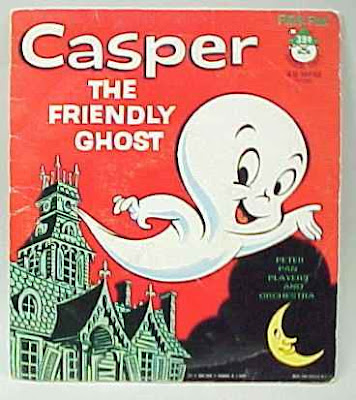You know what is so cool? Having a job where you have a bona fide excuse to communicate through cartoon characters. I simply must work in Bugs Bunny soon. Love that wabbit.
My recent post on ghost blogging (Can you out-source authenticity? ) generated a “spirited” discussion. Is it possible to be a friendly ghost?
There were many well-articulated comments AGAINST ghost-blogging of any kind. To those folks, this is anathema to the implied promise of authenticity of the social web. I invite you to return to the original post to read these important comments by Marian Sparks, Jamie Wallace, Nate Towne, and Phil Corbett.
Other contributors, including Danny Brown, John Bottom, and Michele Linn , suggest it’s more appropriate to ghost blog for a “brand” instead of a person.
But I’m a practical dude. For me, it’s not so much a question of whether people should do it or not do it … because it’s already being done! Moroever, it’s a growing professional opportunity, fueled by the social web’s insatiable appetite for content. And, as Jamie Wallace submits, most CEO’s “can’t write their way out of a paper bag.”
If it’s going to be done (and it is) how do we do it WELL? If you’re a CEO looking for a ghost writer or a writer looking for a CEO, here are best practices suggested by the {grow} community:
>> There were many analogies that described ghost-blogging as an extension of other accepted business practices such as creating speeches, shareholder letters, power point presentations, etc. for executives. Today, PR and legal folks already prepare content for the company’s thousands – perhaps millions – of “followers.” In this rockstar world, personal connection seems impossible, and far less important than accurate and interesting information.
>> But even those who supported ghost blogging felt that Twitter needs to be held to a different standard. Twitter is a more in-the-moment representation of a personality and it seems deceptive to represent a “real-time” personality in that forum.
>> Likewise, any content aimed at a personalized connection – such as responses in a blog comment section – should be authored by the executive, not the ghost writer. Ever.
>> Be sure there is an approval process in place that can handle the need for flexibility, responsiveness and the opportunistic tendencies of the social web.
>> The host executive should provide general ideas for a ghosted blog post and a few bullet points expressing key thoughts for the writer to work from. Obviously the writer needs to spend as much time as possible with the host to get a feel for their language and opinions.
>> The executive should approve every blog post before publishing under their name.
>> Several people opined that the there should be a way to discern who is actually writing or helping with the blog. Perhaps this information, as well as other guidelines of the corporate blog process could be contained in an “about” section.
One of the last comments of the blog is by Jeff Hurt and provides a poignant coda to the topic:
“Ultimately, it’s about words and their context. Words are used to build trust and destroy, persuade and influence, communicate feelings and beliefs, divide and conqueror, sell and pitch, love and hate. Words are powerful. … People put a lot of stock into another person’s words and if they discover that those words are not really the true words of the perceived writer, there can be negative consequences … You are trusted or distrusted by your words. If you don’t have any words to share, and must hire someone to write them, then perhaps there is a bigger issue at hand. If a ghostwriter is giving your concepts and words fresh life, stringing them together attractively, it seems that might be acceptable, as long as the original thoughts are yours.”
What do you think? Are these guidelines ghost-friendly?



